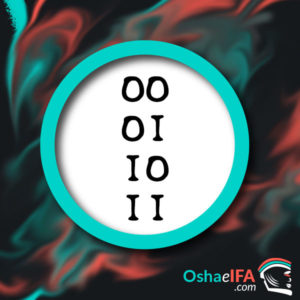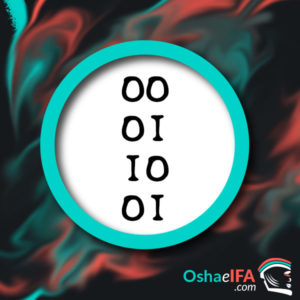Ofun Yemilo (Ofun Oyekun)

Ofun Yemilo is the union of the elder Odu Ofun and Oyeku, it portends prosperity for the consulted. However, for this prosperity to materialize, specific sacrifices and the organization of a celebration in honor of Ifá are required.
Overview of the Odu of Ifa Ofun Oyekun
In the Odun Ofun Yemilo (Ofun Oyekun), we enter an Ifá sign that illuminates the path to a deep understanding of our spiritual and earthly responsibilities. This sign reveals the essential practices and rituals to honor the cycle of life and death, as well as the importance of family solidarity and the correct veneration of deities.
Names or Nicknames
- Ofun Oyekun.
- Ofun Yemilo.
- Ofun Yekun.
- Ofun Yeku.
What is born in the Odu of Ifá Ofun Yemilo?
- The Obá's farewell and the respective ceremonies that must be performed.
- The reason why the otá of the Oshas and Orishas are taken to the river after the death of the owner.
- The situation where Ikú looks for one person but ends up taking another.
- The importance of helping brothers.
- The practice of having the Awó perform Ebbo before doing it to the Aleyo to avoid head changes.
- The impossibility of a King being crowned without Oba Kolaba on the throne of Alafin.
- The relevant Eweses here are peanut, hen's foot, zazafras, sage, and mango.
What does the sign of Ifa Ofun Yemilo speak of?
- It is advised that the awó perform an ebbo on the woman, followed by one of his own and then ofikale trupon with her to solve sexual problems.
- The practice of sleeping once a week with Orunmila on the mat stands out.
- Emphasis is placed on the farewell and ceremonies necessary before the consecration of a new obá.
- Ofun Yemilo is often found troubled by his manhood and sexual debauchery.
- The physical destruction of Ofun Yekun is mentioned because the obiní gave him mamú okó.
- Ofun Yemilo must receive Ozain to solve his natural weakness; The woman is attracted to Mamú Okó and Ofikale Trupon for Idí.
- It is suggested that the owner of this Ifá, "Ofun Yemilo", has had an orisha incorrectly consecrated.
Ofun Yeku points out:
- People ruled by this Odu often face problems of impotence. To overcome this condition, it is essential to receive Ozain.
Explore the mysterious world of Ozain, the Orisha of nature, herbs and medicine. Immerse yourself in his ancestral wisdom and discover how his vital presence influences health and spirituality.
Analysis and Interpretation of the Sign Ofun Yemilo (Oyeku):
Ofun Yemilo warns about the importance of saying goodbye to the Obá with appropriate ceremonies, marking the transition and respect for spiritual roles. He highlights the practice of taking the otá of the Oshas and Orishas to the river after the death of the owner, an act of return and liberation.
Economic Aspects
This Odu emphasizes the need to financially support siblings, even when they do not contribute at work, as a way to obtain maternal blessings, either during life or after death. He highlights the importance of performing Ebo, not only for the consultant but also for the Awó, as a means to prevent the exchange of adverse destinies.
"Salud"
Ofun Yemilo approaches health from a perspective of balance and self-care, mentioning the risk of injuries to the legs or feet and the tendency to face sexual problems or debauchery. The recommendation to receive Ozain suggests the search for strength and purification through herbal and spiritual knowledge.
Religious Aspects
The relationship with the divine in Ofun Yemilo is complex, signaling a tendency towards curiosity or skepticism towards religious practices. The surrender of warriors and the need to maintain a dry óbi highlight the importance of constant spiritual protection. The conflict between Shango and Elegua over the person indicates a significant internal or external struggle that requires attention and resolution.
Personal relationships
The sign suggests challenges in personal relationships, especially in the area of love and sexuality. The reference to the Obiní in Ofun Yemilo with the Obo Iná suggests intense passions that can lead to conflicts or misunderstandings if not handled with care and mutual respect.
Ofun Yemilo is a call to conscience, respect for traditions and care for family and spiritual relationships. It teaches us about the importance of preparation and respect in life transitions, the need for mutual support and the search for balance between desire and responsibility. This Odu reminds us that prosperity and luck are the result of listening to and honoring the voices of our ancestors and deities, as well as maintaining ethically and spiritually aligned behavior.
Discover the power and passion of Shango, the Orisha of thunder, justice and dance. He explores how the dynamic energy of it permeates daily existence and the worship of it enriches religious practice.
Recommendations of the Ifa sign Ofun Yemilo:
- Specialize in the care and worship of Eggun, delving into practices and rituals that honor ancestors to ensure spiritual harmony and connection with the afterlife.
- Receive Oba Kolaba, which is essential for those who seek a deeper connection with their spirituality and wish to strengthen their position and protection within the religious sphere.
- Receive warriors, a crucial step to strengthen personal protection against adversities and to ensure the guidance and support of the deities in life's challenges.
- Financially support family members, especially to siblings, to keep family ties strong and attract maternal blessings.
- Practice Ebo for both the Awó and the consultant before any other work, thus avoiding adverse exchanges of destiny.
- Seeking knowledge and purification through Ozain, to strengthen health and solve problems of sexual debauchery.
- Maintain constant spiritual protection, always carrying a consecrated ball of efún and paying attention to the warriors received.
- Listen to and honor the voices of ancestors and deities, as a means to achieve luck and prosperity.
- Take care of physical health, paying special attention to possible injuries to the legs or feet.
Prohibitions of Ofun Yemilo (Oyekun):
- Make jute sack clothes for its use, due to the possible negative implications on health and luck.
- Neglecting support for blood brothers, as this could negatively affect the receipt of blessings.
- Ignore religious and spiritual practices, such as disinterest in the Saint or carrying out works out of simple curiosity without adequate follow-up.
- Ignoring messages from the mother (living or deceased), since these can be key to prosperity and well-being.
- Neglecting self-care and sexual balance, which could lead to problems in personal relationships and health.
These recommendations and prohibitions highlight the importance of spiritual dedication, care for family and personal relationships, and health, as well as spiritual protection and purification as fundamental pillars for those ruled by Ofun Yemilo.
Sayings of the sign Ofun Yemilo:
- As much good as you do, so will the reward be.
- Do not hurt another, because it hurts.
- Take care of yourself before others.
- First God, then the Saints.
- They pay just for sinners.
- Never try to do what is forbidden, because you get lost.
The saying “As much good as you do, so will be your reward” emphasizes the importance of our actions and their impact on the future. It suggests that kindness and good deeds not only benefit others, but also prepare us to receive similar blessings. This principle highlights the law of cause and effect in our lives, reminding us that generosity and integrity lead us to a full and enriching life.
Ifa Code of Ethics of the Sign Ofun Yekun
- Sexual excess produces the physical destruction of the Awó.
You may also like: Sign of Ifa Ofun Meyi (Oragun)
Meaning of the sign Ofun Yemilo:
Ifá indicates that this sign predicts well-being for the person concerned, anticipating an exchange of mutual aid that will be beneficial, regardless of who the beneficiary or benefactor is. The importance of sacrifice as a means to ensure this well-being is highlighted. The ancestral tradition of this family must continue to avoid disturbance of the ancestral spirits.
The holder of Ofun Yemilo must always carry with him a ball of efun, consecrated on the Ifá board, applying it to his face and hands to avoid Ikú, death, which stalks him.
Shangó and Elegua dispute the protection of this person, each wishing to be his tutelary orisha.
Ofun Yemilo has brothers who shy away from work; However, it is essential that he supports them financially to earn the blessing of his mother, whether she is alive or has passed into the spiritual world. A chicken must be offered to Eggun in honor of her mother, and if she lives, it is consulted which female Eggun will receive the offering.
This sign warns of possible injuries to the legs or feet, and it is common for people with disabilities to be enemies of Ofun Yemilo.
Often, those born under this sign can show skepticism towards religious practices, going to consultations more out of curiosity or specific need than out of faith. Later, they might be reluctant to follow spiritual recommendations.
If warriors are received, a dry coconut must also be consecrated, which is washed and used in rituals with these warriors, always keeping it close to them as a symbol of protection and spiritual connection.
Says Ifa odu Ofun Yemilo (Oyekun)
You should attend to an item of clothing that you have left behind and be cautious if you plan to visit a place where your enemies may be; Wear white to protect yourself, as his mind is restless.
An ailment that he suffers can only be alleviated by Orunmila. It is imperative to receive it, and if she is a woman, she must obtain Ikofafun and join in marriage with an Awó. She performs a mass in honor of a deceased relative. Her impotence, caused by sexual excesses, requires attention. Avoid risky sexual practices that could be her downfall.
Lack of support from your partner negatively affects your fortune and prosperity. Her family faces difficulties, especially her brothers; Give them her support. Her inclination towards excessive pleasure needs moderation. Women are attracted to seduction, but you should exercise caution in your interactions.
Prayer of Oddun Ofun Yemilo Ifa:
Ofun yemilo kunuku abanikunlo inle olofin akalambo abigui olorun ninshawo inle olofin tente tera abi apolo maferefun obatala ati eshu.
Ofun Yeku's Ebbo 10-2 for impotence:
- a red rooster
- A cockscomb chicken
- Ewé tomodé (specific herb)
- two chickens
- Cinnamon
- Smoked fish and smoked jutía
- Palm oil
- Toasted corn
- Fish head
- Schnapps
- Honey
- a jicotea
- Abundant money
It is important to offer the jicotea to Ozain as part of the ritual.
You can read: Ifa sign Oyekun Berdura
Patakies (Stories) of the sign Ofun Oyekun:
Ikú, Ozain, Olofin and Ofun Yemilo sat at the table
In the land of Kumakú there lived an Awó called Ofun Yemiló, recognized for his deep knowledge of the secrets of Egungun and an expert in preparing funeral honors. His reputation was such that, after the death of Akambi, son of Oduduwa and Obá of the land, Ofun Yemiló was summoned to perform a great ceremony. Before leaving, he performed an Osode, seeing his sign, and performed a Paraldo, offering an Ayapá to Ozain to accompany him.
Upon arriving at the palace, where everything was decorated with ashó dundun, they found a table with nine seats and plates, presided over by Ikú Alashona, dressed in black, and Olofin, resplendent. His arrival was announced by Ashikuelú, the somber doorkeeper, who sang a suyere in his honor. Olofin and Ikú stood up as a sign of respect, and after greetings, the ceremonies in honor of Akambi Egungun began. At the end, everyone together threw the ceremonial elements into the joro joro, sealing it with efún.
Olofin and Ikú retired, and Ofun Yemiló together with Ozain prepared the float to take Akambi's corpse to the river, along with a small Erupin, sending it to Ode to allow the election of a new Obá in Kumakú.
Explanation: History teaches us the value of respect and cooperation between the living and the dead, as well as the importance of following traditions and rituals with honor and dignity. It demonstrates how mutual respect and compliance with spiritual practices ensure balance and social order, allowing the community to move forward and appoint new leaders.
Ofun Yeku, his Iyaré (mother) Mayekun Fun, Osain and Olofin
In the path of Ofun Yeku, his mother Mayeku Fun, along with Ozain and Olofin, the story of a family facing difficulties in Mawalodofun is told. Mayeku Fun, desperate about the situation of her children, especially Ofun Yeku, who used to play in the mud and eat her brothers' food, was looking for a solution without resorting to violence. Observing the prosperity of her neighbors, she sank into despair and crying.
Olofin, witness to her suffering, transformed her while she sang a prayer of hope. Ozain, attracted by the song, created a wind that gathered limayas, wrapped them in leaves and scattered them in the mud, singing a song of transformation and promise. Upon arriving at Mayeku Fun, he offered her the limeas as a symbol of future help, even though they fell into the mud due to abundance.
Witnessing this, Ofun Yeku walked over, picked up the blessed limeyas, and with his mother's blessing, began to see positive changes. Prosperity came to Ofun Yeku and his brothers, especially those who did not work, showing that effort and faith in spiritual guidance can transform adversity into well-being.
Explanation: History teaches us about the importance of perseverance, faith and divine intervention in the most difficult times. It highlights that sometimes the solution to our problems can come in unexpected ways and that the blessing and recognition of deities can change our destiny towards prosperity. It also teaches the value of remembering and thanking those who help us in times of need.
Òfún Yemilo Ifa Traditional
ÒFUN ÒYÈKÚ
Òrúnmìlà wí ó ló di mómó jojo
Wón ló di fèèrè i tìmó
Òrúnmìlà ló dùn jojo
Emi náà ló dùn jojo
Ifá ló dùn bii kinni?
Wón ló dùn bí àmú omo they were
Òrúnmìlà lámùú how they were ò tí dùn tú áráárá
Òrúnmìlà wí ó ló di mómó jojo
Mo ló di fèèrè i tìmó
Òrúnmìlà ló dùn jojo
Emi náà ló dùn jojo
Ifá ló dùn bii kinni?
Mo lo dùn bí àmú omo eku
Ifá lamùú omo eku ò tí dùn tú áráárá
Ifá wí ó ló di mómó jojo
Mo ló di fèèrè i tìmó
Òrúnmìlà ló dùn jojo
Emi náà ló dùn jojo
Ifá ló dùn bii kinni?
Wón ló dùn bí àmú omo eja
Ifá lamùú omo eja ò tí dùn tú áráárá
Òrúnmìlà wí ó ló di mómó jojo
Wón ló di fèèrè i timo
Òrúnmìlà ló dùn jojo
Emi náà ló dùn jojo
Ifá ló dùn bii kinni?
Wón ló dùn bí àmú omo eye
Òrúnmìlà lámùú omo eye ò tí dùn tú áráárá
Òrúnmìlà wí ó ló di mómó jojo
Mo ló di fèèrè i tìmó
Òrúnmìlà ló dùn jojo
Emi náà ló dùn jojo
Ifá ló dùn bii kinni?
Mo lo dùn bí àmú omo eni
Ifá ni mo seun seun
Ifá pé àmú omo eni ló dùn
Ó lamùú omo eku ò tí dùn áráárá
Ó lamùú omo eja ò tí dùn áráárá
Àmú omo eye ò tí dùn áráárá
Àmú omo sonko ò tí dùn áráárá
Amú omo ènìyàn or tí dùn
Àmú omo eni ló dùn ló jóyin lo
Omo ló ti dùn ló jóyin lo
Omo lo ti dun
omo ju àmú
Omo ló ti dùn ló jóyin lo.
Ifá advises this person to offer sacrifice for a benevolent son. His things will be fine. Òrúnmìlà said that he is shining
I said it's about to dawn
Òrúnmìlà said it's very sweet
I also said that it is very sweet
This is as sweet as what? Orúnmìlà asked
They said this is as sweet as the milk that is in an animal's breast
Ifá said that the breast of an animal is not so sweet
Ifá said that it is shining
I said it's about to dawn
Òrúnmìlà said that it is very sweet
I also said that it is very sweet
This is as sweet as what? Orúnmìlà asked
They said this is as sweet as the milk in a rat's breast
Ifá said that the chest of a rat is not so sweet
Òrúnmìlà said it's shining
I said it's about to dawn
Òrúnmìlà said it's very sweet
I also said that it is very sweet
This is as sweet as what? Orúnmìlà asked
They said this is as sweet as the milk in a fish's breast
Ifá said that the breast of a fish is not so sweet
Òrúnmìlà said it's shining
I said it's about to dawn
Òrúnmìlà said it's very sweet
I also said that it is very sweet
This is as sweet as what? Orúnmìlà asked
They said this is as sweet as the milk in a bird's breast
Ifá said that the breast of a bird is not so sweet
Òrúnmìlà said it's shining
I said it's about to dawn
Únrúnmìlà said this is so sweet
I also said that it is very sweet
This is as sweet as what? Ifá asked
I said it's as sweet as milk from a baby's breast
Thank you, thank you very much, Ifá said
Ifá said that a baby's breast is sweeter
He said the rat son's chest is not so sweet
The breast of the son of the fish is not so sweet
He said that a bird's breast is not so sweet
An animal's baby breast is not so sweet
But the breast of the son of a Man is the only one that is so sweet
The breast of the son of man is as sweet as honey
The son is as sweet as honey
The son is the only one who is so sweet
The son is bigger than the sweetness of the breast
The son is as sweet as honey.
Eshu of the Sign Ofun Yemilo (Ofun Yekun): Eshu Jakima
Eshu Jakima, is a prominent figure among the great Bokonos of Dahomey, playing a crucial role as guardian of the abodes of the Awoses. This specific Eshu, characterized by his doll-like figure with two joined bodies, is responsible not only for regulating access to the house, but also for protecting it from adverse energies and tracking down enemies and evil spirits.
For its consecration, it is pierced through the head (lerí) and various elements are incorporated for its loading, including:
- Heads of different animals such as the dog, the parrot, the rooster, the goose, the vulture, the dove, the hawk and the woodpecker.
- A selection of sacred sticks, each with specific properties within the Yoruba tradition, and sacred herbs for protective and cleansing purposes.
- Additional ingredients such as precious metals, roots of sacred trees, and soils collected from places with spiritual significance, along with offerings of animals and natural elements.
Once the load is completed, the figure is fed with seven small chickens, then distributing parts of these in strategic places such as the entrance to the cemetery, the seashore, the doors of the house, the four corners of a crossroads, the bank of a river, the entrance to a prison and in the mountains. This process not only enshrines the figure but also extends its protection to these key points.
The doll, carved naked, is finished with cement, thus consolidating its form and function. Eshu Jakima becomes a powerful ally for practitioners, offering guard and protection against adversities and negative energies, ensuring the safety and purity of the home and its inhabitants.















I would like to know the meanings of all the words from Yoruba to Spanish